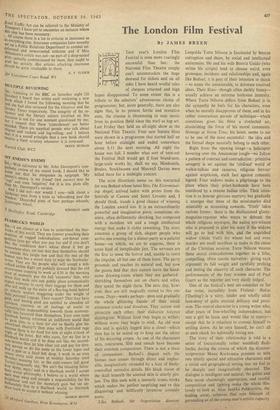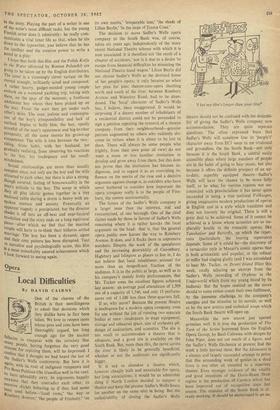The London Film Festival
By JAMES BREEN THIS year's London Film Festival is even more roaringly successful than last : the
National Film Theatre simply can't accommodate the huge demand for tickets and on all sides I have heard woeful tales of cheques returned and high hopes disappointed. To some extent this is a tribute to the selectors' adventurous choice of programmes; but, more generally, there are also signs that, in its present fertile and inventive state, the cinema is threatening to oust music from its position (held since the war) as top art. Last Friday they held an all-night show at the National Film Theatre. Four new feature films were shown in a programme that started half an hour before midnight and ended somewhere about 8.15 the next morning. All night the house was full. I wonder what sort of turn-out the Festival Hall would get if four brand-new, large-scale works by, shall we say, Hindemith, Boulez, Stockhausen and Maxwell Davies were billed there for a midnight concert.
The most illustrious name on this nocturnal list was Buil/lel whose latest film, The Exterminat- ing Angel, arrived laden with prizes from the festivals at Cannes and Sestri Levante and, I should think, stands a good chance of winning the London award too. It is an extraordinarily powerful and imaginative piece, sometimes ob- scure, often deliberately shocking, but composed with a mordant wit and a tough intellectual energy that make it richly rewarding. The story concerns a group of rich, elegant people who arrive one evening for a dinner-party at a palatial house—on which, we are to suppose, there is some kind of inexplicable jinx. The servants are the first to sense the horror and, unable to resist the impulse, all but one of them leave. The party proceeds and reaches its natural end, but now the guests find that they cannot leave the hand- some drawing-room where they are gathered: stretching themselves out on chairs and sofas, they spend the night there. The next day, how- ever, they are still magically rooted to this one room. Days—weeks perhaps—pass and gradually the whole glittering façade of their social existence cracks and dissolves. They accuse and persecute each other; their elaborate toilettes disintegrate. Without food they begin to wither; without water they begin to stink. An old man dies and is quickly lugged into a closet—which then has to be sealed up to keep out the odour of his decaying corpse. As one of the characters says, coarseness, filth and stench have become their constant companions. There is not a trace of compassion: Builuel's disgust with the human race comes through direct and implac- able, imaginatively extended by a host of finely- controlled surrealist details. His black vision of the skull beneath the scented skin is utterly piti- less. The film ends with a masterly ironic stroke which makes the perfect surprising end to this disquieting and brilliantly inventive comedie noire.
Like Bufluel, the Argentinian director
Leopoldo Torre Nilsson is fascinated by human corruption and sham, by social and intellectual antinomies. He and his wife Beatriz Guido (who writes his scripts) tend to choose weird, even grotesque, incidents and relationships and, again like Buriuel, it is part of their intention to shock —to name the unnameable, to detonate received ideas. Their films—though often darkly funny— usually achieve an extreme hothouse intensity. Where Torre Nilsson differs from Butluel is in the sympathy he feels for his characters, even when he morally disapproves of them, and in his rather ostentatious parade of technique—which sometimes gives his films a confected air, diminishing the force of his moral comments. Homage at Siesta Time, his latest, seems to me to be one of the most successful: the idea and the formal shape naturally belong to each other.
Right from the opening image—a helicopter hovering over the Amazonian jungle—we follow a pattern of contrast and contradiction: primitive savagery is set against the 'civilised' world of walkie-talkies and cameras, religious fervour against scepticism, stark fact against romantic legend. Four widows make a pilgrimage to the place where their priest-husbands have been murdered by a remote Indian tribe. Their inten- tion is to honour glorious martyrs; but gradually it emerges that three of the missionaries died miserably as screaming cowards. 'Truth' takes various forms: there is the disillusioned glossy- magazine-reporter who wants to debunk the whole religious mystique, the native eye-witness who is prepared to alter his story if the widows will go to bed with him, and the anguished widow (Alida Valli) for whom bed and even murder are small sacrifices to make in the cause of the Christian mission. Torre Nilsson weaves these moral contradictions together in a lithe, compelling, often caustic narrative: giving each argument its full weight and carefully probing and testing the sincerity of each character. The performances of the four women and of Paul Guers as the reporter are very nicely judged.
One of the festival's best sex-comedies so far has come, incredibly from Finland: Rakas (`Darling') is a witty, tender and wholly adult love-story of quite unusual delicacy and preci- sion. The central character is a young writer who, after years of free-wheeling independence, has met a girl he loves and would like to marry— except that he is reluctant to commit himself to settling down. As he says himself, he can't all at once check his habitually roving eye.
The story of their relationship is told in a series of (occasionally rather muddled) flash- backs, during the course of which the director- scriptwriter Mani' Kurkvaara presents us with two utterly special and attractive characters and a social and geographical setting that we feel to be sharply and imaginatively observed. The dialogue is intelligent and natural, the guitar and flute music charmingly appropriate, and careful composition and lighting make the whole film lovely to look at. Also, Jaakko Pakkasvirta, the leading actor, achieves that rare triumph of persuading us of the young man's artistic capacity
in the story. Playing the part of a writer is one of the actor's most difficult tasks, but the young Finnish actor does it admirably: he really corn- Municates a vital inner life so that, when he sits down to the typewriter, you believe that he has the intellect and the creative power to write a novel or a play.
I hope that both this film and the Polish Knife fin the Water (directed by Roman Polanski) are going to be taken up by the English distributors. The latter is a stunningly clever variant on the eternal triangle, brilliantly acted and composed. A rather hearty, gadget-minded young couple embark on a weekend yachting trip, taking with them, on the spur of the moment, a footloose adolescent boy whom they have picked up on the way. From the start they get under each other's skins. The man, jealous and contemptu- °us of the boy's irresponsibility and lack of method, begins to bully him; the boy, openly scornful of the man's squareness and big-brother pomposity, all the same resents his grown-up competence. The wife is torn between the two : siding, from habit, with her husband, yet gradually realising, from observing his reactions to the boy, his inadequacy and his small- Mindedness.
Sexual relationships are more than usually complex since, not only are the boy and the wife attracted to each other, but there is also a strong, though covered, feeling of homosexuality in the Man's attitude to the boy. The scene in which they all play idiotic games together in a tiny enclosed cabin during a storm is heavy with un- sPoken menace and anxiety. Eventually an apparent tragedy is precipitated, but the director shades it off into an off-beat and near-farcical resolution and the story ends on a long equivocal Pause—after which we feel that the married couple will have to re-think their hitherto settled marriage. The boy has been a dynamic agent and their cosy pattern has been disrupted. Taut to narrative and psychologically acute, this film Is a most remarkably assured achievement which I look forward to seeing again.















































 Previous page
Previous page